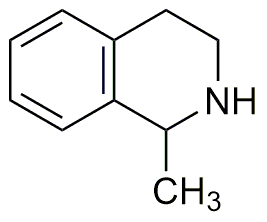1-Methyl-1,2,3,4-tetrahydroisoquinoline is widely utilized in research focused on:
- Pharmaceutical Development: This compound serves as a key intermediate in the synthesis of various pharmaceuticals, particularly those targeting neurological disorders. Its structural properties allow for the development of effective treatments.
- Neurochemistry Research: Researchers leverage its unique chemical structure to study neurotransmitter systems, contributing to a better understanding of brain function and the development of therapies for mental health conditions.
- Organic Synthesis: It is used in organic chemistry as a building block for creating more complex molecules, facilitating the development of new materials and compounds in various industries.
- Natural Product Synthesis: This compound is involved in the synthesis of natural products, aiding researchers in creating compounds that mimic or enhance the effects of naturally occurring substances.
- Analytical Chemistry: It is utilized in analytical methods to detect and quantify related compounds, providing valuable data for quality control in pharmaceutical manufacturing.
Informations générales
Propriétés
Sécurité et réglementation
Applications
1-Methyl-1,2,3,4-tetrahydroisoquinoline is widely utilized in research focused on:
- Pharmaceutical Development: This compound serves as a key intermediate in the synthesis of various pharmaceuticals, particularly those targeting neurological disorders. Its structural properties allow for the development of effective treatments.
- Neurochemistry Research: Researchers leverage its unique chemical structure to study neurotransmitter systems, contributing to a better understanding of brain function and the development of therapies for mental health conditions.
- Organic Synthesis: It is used in organic chemistry as a building block for creating more complex molecules, facilitating the development of new materials and compounds in various industries.
- Natural Product Synthesis: This compound is involved in the synthesis of natural products, aiding researchers in creating compounds that mimic or enhance the effects of naturally occurring substances.
- Analytical Chemistry: It is utilized in analytical methods to detect and quantify related compounds, providing valuable data for quality control in pharmaceutical manufacturing.
Documents
Fiches de données de sécurité (FDS)
La FDS fournit des informations de sécurité complètes sur la manipulation, le stockage et l’élimination du produit.
Spécifications du produit (PS)
Le PS fournit une description complète des propriétés du produit, notamment sa composition chimique, son état physique, sa pureté et les exigences de stockage. Il détaille également les plages de qualité acceptables et les applications prévues du produit.
Certificats d'analyse (COA)
Recherchez des certificats d'analyse (COA) en saisissant le numéro de lot du produit. Les numéros de lot et de lot se trouvent sur l'étiquette d'un produit, après les mots « Lot » ou « Lot de fabrication ».
Numéro de catalogue
Numéro de lot/série
Certificats d'origine (COO)
Ce certificat d'exploitation confirme le pays dans lequel le produit a été fabriqué, et détaille également les matériaux et composants utilisés et s'il est issu de sources naturelles, synthétiques ou autres sources spécifiques. Ce certificat peut être requis pour les douanes, le commerce et la conformité réglementaire.
Numéro de catalogue
Numéro de lot/série
Fiches de données de sécurité (FDS)
La FDS fournit des informations de sécurité complètes sur la manipulation, le stockage et l’élimination du produit.
DownloadSpécifications du produit (PS)
Le PS fournit une description complète des propriétés du produit, notamment sa composition chimique, son état physique, sa pureté et les exigences de stockage. Il détaille également les plages de qualité acceptables et les applications prévues du produit.
DownloadCertificats d'analyse (COA)
Recherchez des certificats d'analyse (COA) en saisissant le numéro de lot du produit. Les numéros de lot et de lot se trouvent sur l'étiquette d'un produit, après les mots « Lot » ou « Lot de fabrication ».
Numéro de catalogue
Numéro de lot/série
Certificats d'origine (COO)
Ce certificat d'exploitation confirme le pays dans lequel le produit a été fabriqué, et détaille également les matériaux et composants utilisés et s'il est issu de sources naturelles, synthétiques ou autres sources spécifiques. Ce certificat peut être requis pour les douanes, le commerce et la conformité réglementaire.


